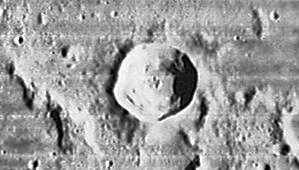Lalande
Contents
Lalande
| Lat: 4.4°S, Long: 8.6°W, Diam: 24 km, Depth: 2.59 km, Rükl: 43 |

LO-iv-113-h3 submitted by Amoroso
Images
LPOD Photo Gallery Lunar Orbiter Images Apollo Images
WARNING: the name Lalande is mentioned on many orbital frames of Apollo 12's three stereo-strips 56-B, 56-C, and 56-D. In fact, most of these frames don't show Lalande at all! All the frames of these three stereo-strips show the same caption: DESCARTES - LALANDE - MCCLURE - THEOPHILUS (which seem to have been four of the most important "landmarks" on these stereo-strips).- DannyCaes Aug 15, 2010
- On the Arizona State University's (ASU's) zoomify-scans of Apollo 16's northward looking Fairchild magazines REV 27 and REV 37 it is possible to detect a certain degree of reflected light on Lalande's shadowed floor and eastern inner slopes.- DannyCaes Oct 2, 2010
- Post sunrise illumination at Lalande: Apollo 16's orbital panoramic ITEK-camera frames AS16-P-4676 and AS16-P-4681 (rightmost margins of both frames).
- Lalande was also captured near the rightmost margins of Apollo 16's orbital panoramic ITEK-camera frames AS16-P-5396 and AS16-P-5401.
Research Danny Caes
Maps
(LAC zone 77A4) LAC map Geologic map LM map AIC map Topophotomap
Description
Description: Elger
(IAU Directions) LALANDE.--A very deep ring-plain, about 14 miles in diameter, N.W. of Ptolemaeus, with bright terraced walls, some 6,000 feet above the floor, which contains a low central mountain. On the N. is the long cleft running, with some interruptions, in a E.N.E. direction towards Reaumur.
Description: Wikipedia
Additional Information
- Depth data from Kurt Fisher database
- Arthur, 1974: 2.59 km
- Westfall, 2000: 2.59 km
- Viscardy, 1985: 2.59 km
- Cherrington, 1969: 1 km
- Exterior impact melt deposits most extensive to NE, max of ~5 km beyond rim, and topographically lowest rim crest to N (Hawke and Head, 1977).
- Study of the Sayh al Uhaymir meteorite from the Moon recognized that it is high in thorium, and one of the richest-thorium regions on the Moon is near the crater Lalande. The study authors proposed that a shock event at 2.80 billion years was the time of formation of Lalande. This is somewhat more than speculation and is a geologically likely age for the crater. - tychocrater Aug 21, 2007
- Included in ALPO list of bright ray craters
- Satellite craters Lalande A and C are included in the ALPO list of banded craters
- Lalande and Lalande A & C are thermal anomaly craters, implying youthful ages - Moore et al, 1980
- TSI = 25, CPI = 20, FI = 20; MI =65 Smith and Sanchez, 1973
Nomenclature
- Named for Joseph Jérôme Lefrançais de Lalande (July 11, 1732 – April 4, 1807), a French astronomer and writer. He devoted himself to the improvement of the planetary theory. His star catalog of 1801 contains many faint (low mass) but nearby stars.
- La Lande (later changed to Lalande) was one of eight names introduced by Lohrmann (Whitaker, p. 119). All of Lohrmann's names were adopted by the three "authorities" cited in Mary Blagg's Collated List, and incorporated into the original IAU nomenclature of Blagg and Müller (1935).
- Lalande A, a bowl-shaped secondary crater south-southwest of Lalande itself, was once known as Rodes (Père Rodes). This was one of Felix Chemla Lamech's new names, but the I.A.U. did not accept that name. -- Research Lamech's "Rodes": Whitaker (p. 228) and Ewen A. Whitaker and Danny Caes (August 2003, mail correspondence).
- Lalande Delta (hill west of Lalande).
- Lalande Eta (elongated hill west of Lalande, east-northeast of Fra Mauro).
- Lalande Iota (elongated hill southwest of Lalande A).
- Lalande Omega (seems to be near Lalande Delta) (for the hills Lalande Delta, Eta, and Iota, see Chart 68 in the Times Atlas of the Moon).
LPOD Articles
Bibliography
Lalande and his celestial cat (Felis)
It should be mentioned that somewhere in (or around, or long before) 1805 Joseph J. L. de Lalande wanted to see a new constellation between Antlia and Hydra, and decided to create a cat (Felis) from several inconspicuous stars up there.
- From page 221 in Richard Hinckley Allen's book Starnames, their Lore and Meaning (Felis, the Cat) :
- I am very fond of cats. I will let this figure scratch on the chart. The starry sky has worried me quite enough in my life, so that now I can have my joke with it.
See also: Felis
]]]